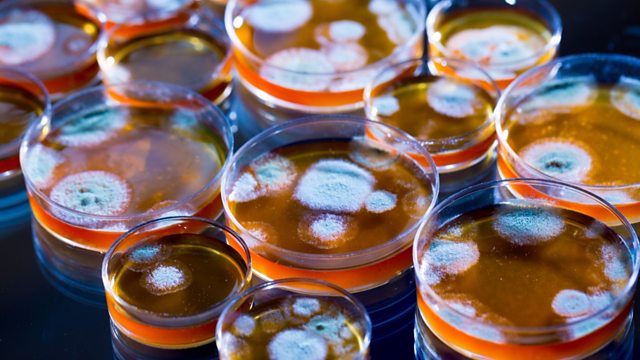Antibiotics
It’s hard to overstate the impact of antibiotics on the way we live. But the story of antibiotics is a cautionary one. And unhelpful economic incentives are in large part to blame
In 1928 a young bacteriologist named Alexander Fleming failed to tidy up his petri dishes before going home to Scotland on holiday. On his return, he famously noticed that one dish had become mouldy in his absence, and the mould was killing the bacteria he’d used the dish to cultivate. It’s hard to overstate the impact of antibiotics on medicine, farming and the way we live. But, as Tim Harford explains, the story of antibiotics is a cautionary one. And unhelpful economic incentives are in large part to blame.
Producer: Ben Crighton
Editors: Richard Knight and Richard Vadon
(Image: Penicillin Fungi, Credit: Science Photo/Shutterstock)
Last on
Sources and related links
Philip Lymbery and Isabel Oakeshott Β - Farmageddon: The true cost of cheap meat, Bloomsbury, 2014, pp306-307
Antimicrobials in agriculture and the environment: Reducing unnecessary use and waste. The Review on Antimicrobial Resistance Chaired by Jim O’Neill, December 2015
Antimicrobial Resistance: Tackling a crisis for the health and wealth of nations. The Review on Antimicrobial Resistance Chaired by Jim O’Neill, December 2014
Antimicrobials in agriculture and the environment: Reducing unnecessary use and waste. The Review on Antimicrobial Resistance Chaired by Jim O’Neill, December 2015Β
Broadcasts
- Sat 21 Jan 2017 19:50GMTΒι¶ΉΤΌΕΔ World Service except Americas and the Caribbean, East and Southern Africa, News Internet & West and Central Africa
- Sun 22 Jan 2017 11:50GMTΒι¶ΉΤΌΕΔ World Service except News Internet
- Mon 23 Jan 2017 04:50GMTΒι¶ΉΤΌΕΔ World Service Australasia
- Tue 24 Jan 2017 23:50GMTΒι¶ΉΤΌΕΔ World Service Americas and the Caribbean
Podcast
-
![]()
50 Things That Made the Modern Economy
The stories of inventions, ideas and innovations which helped create the economic world


